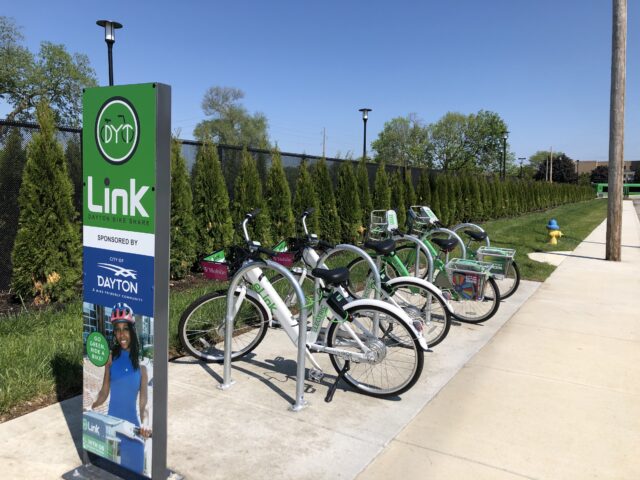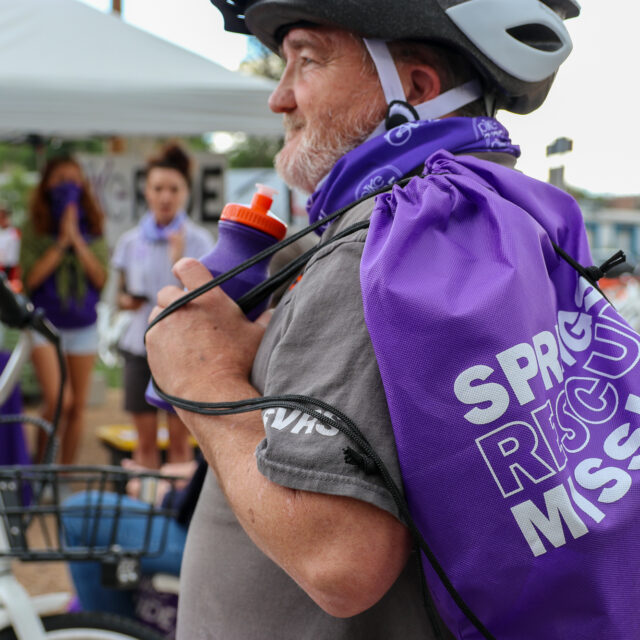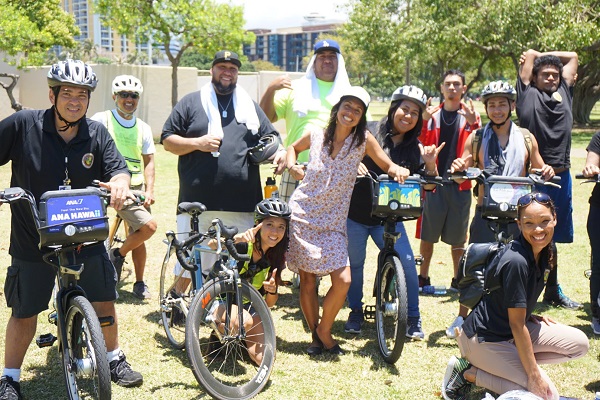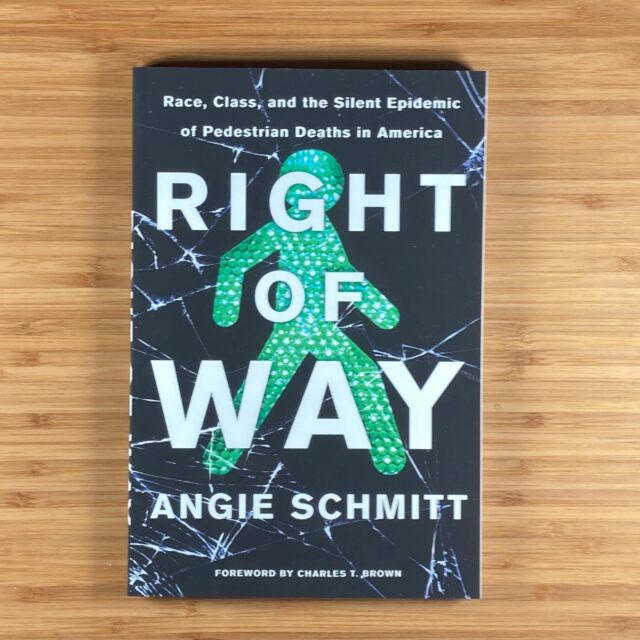United By Bike Share
by Kiran Herbert, Communications Manager
July 9, 2021
Three BBSP mini-grant recipients are working to engage underserved populations in Ohio, Hawaii and North Carolina.

The Link bike share station on the OneFifteen campus in Dayton, Ohio.
In June, we announced 12 new mini-grant recipients, whose various proposals involve everything from community art to electric bikes and span the country from Florida to California. Although all of the projects will reach and engage traditionally underserved populations through shared micromobility, three stand out for the specific groups they plan on targeting: Native islanders, older adults, and folks recovering from addiction.
Rolling to Recovery
OneFifteen, a nonprofit addiction recovery center located in Dayton, Ohio, first opened in September 2019 with an outpatient clinic. In the past two years, the campus has grown to include a crisis stabilization unit, inpatient residential care and low-intensity residential housing, the idea being that patients can access all levels of treatment for substance abuse in one place. Since data shows that 50% of people drop out of recovery whenever there’s a break in care, having a campus with a full continuum of care is key to a patient’s overall success.
“The timing of this grant is so important and impactful because we now have two levels of residential services on our campus, as well as a robust outpatient program,” says Tina Rezash Rogal, marketing and communications manager for OneFifteen. “It’s super important to us that we are providing whole-person care to our patients and that includes physical fitness and physical health.”
In May 2021, Link, Dayton’s bike share system, installed a station on the OneFifteen campus and as part of this grant, the nonprofit will offer free helmets and annual passes to patients that complete an hour-long bicycling safety class. Without scholarships, Rogal doubts people would sign up for bike share on their own, missing out on the physical and endorphin-generating benefits, as well as the transportation opportunity for those living off-campus. Plus, OneFifteen sits just one mile from a beautiful bike path that runs along the Great Miami River, providing an additional opportunity for residents to experience the healing benefits of nature.
OneFifteen is primarily a Medicaid facility and the majority of its patients have been historically underserved by society at large. One of the core values of the nonprofit is to make sure that everyone who walks onto the campus feels like they’re treated with dignity and respect. By providing access to something patients might otherwise not be able to experience—namely, state-of-the-art electric bikes and a beautiful place to ride them—Rogal hopes to pass along the utilitarian, physical and mental benefits of biking.
“I’m a cyclist—I ride every single morning for the mental health reasons way more than the physical reasons,” says Rogal. “If we can introduce our patients to the mental health benefits of cycling and being outdoors and feeling physically strong, well that’s just a win for everybody.”
A New Ambassador Program
Kelsey Colpitts, senior marketing manager at Bike Share Hawaii, the nonprofit that manages Biki in Honolulu, has been with the system since it first launched in 2017. “There’s just two of us at the nonprofit, our executive director and myself, so we thought ambassadors would help increase our reach and impact,” says Colpitts.
Although Biki regularly conducts member surveys, the organization was also looking for new ways to identify areas for growth and solicit direct user feedback. Colpitts decided to apply for BBSP funding to launch a new ambassador program, which would allow the bike share system to recruit, hire and train 10 people from the local community. And since Colpitts also recognized that Native Hawaiians—who make up roughly 10 percent of the state’s population—were underrepresented among Biki’s members, she determined that at least five ambassadors also needed to be Native Hawaiian. At least five ambassadors will also be on government assistance and eligible for Biki’s low-income program, targeting another underserved demographic.
“We think it’s really important to have representation from all different demographics: ages, ethnicities, genders,” says Colpitts, noting that geographical diversity is also key. “We think that it’s really important to increasing our access and our ridership base, making it as equitable and community based a system as possible.”
The ambassador program will last six months, with one ride offered each month as an opportunity to bike together, cultivate community, and gather feedback. Ambassadors will rotate each month so that two people lead each ride—choosing the route, deciding where to stop for food, facilitating discussion—and all ambassadors will have free ride codes and giveaway items to share with friends and families. Since the program is unpaid (ambassadors will get free memberships), social media, blogs posts and other commitments will be determined based on the interest and skills of the final cohort (with extra incentives offered as a reward). When applications closed last month, Biki had received more than 50 submissions.
Making Bicycling Accessible for All
Oaks and Spokes, a Raleigh, North Carolina-based community bike organization, first launched in 2012, although it was completely volunteer-driven until this year when Mary Sell was brought on as interim executive director.
“As an organization, we’re always trying to beat the drum of getting more people on bikes,” says Sell. “We’re trying to shift the culture to make biking a seamless part of our transportation life, and to give people as much access and opportunity to different transportation options as possible.”
In line with that mission, Oaks and Spokes partners with Citrix Cycle, Raleigh’s bike share system, in order to help make it successful. Citrix Cycle recently launched a $10/year Access Pass, the intent of which is to provide a low-cost option for cost-burdened households and those on social security. The open call for BBSP mini-grants presented the perfect opportunity to hone in on targeted demographics and promote the new pass. As part of this grant, Oaks and Spokes will work with AARP and senior living facilities to reach and engage older adults in underserved communities around bike share.
“We saw that there was a gap for older adults within our system,” says Sell, noting that at the same time, the organization had already found an invaluable partner in AARP. “I think that there’s this stereotype that biking is for a certain demographic of people, and we really want to break that down and position it as an organic choice for many.”
Seventy percent of Citrix’s fleet is electric, which further reduces barriers for people—especially those not used to biking or worried about exerting themselves in the heat of the south. Additionally, Oaks and Spokes will use the grant money to hire an intern from a local Historically Black College or University in order to help with event programming and outreach, spreading the word about the accessibility of electric bikes as well as the new Access Pass program.
“We also want to use this opportunity to engage where Citrix Cycle stations are placed,” says Sell. “We would love to spark an ongoing discussion about who this transportation option is serving so we can ensure it’s equitably distributed throughout our community.”
The Better Bike Share Partnership is funded by The JPB Foundation as a collaboration between the City of Philadelphia, the National Association of City Transportation Officials (NACTO) and the PeopleForBikes Foundation to build equitable and replicable bike share systems. Follow us on Facebook, Twitter and Instagram or sign up for our weekly newsletter. Got a question or a story idea? Email kiran@peopleforbikes.org.



